Filed under: Analysis, Anti-Patriarchy, Community Organizing, Featured, Gentrification, Labor, Police, Repression, Southeast, The State
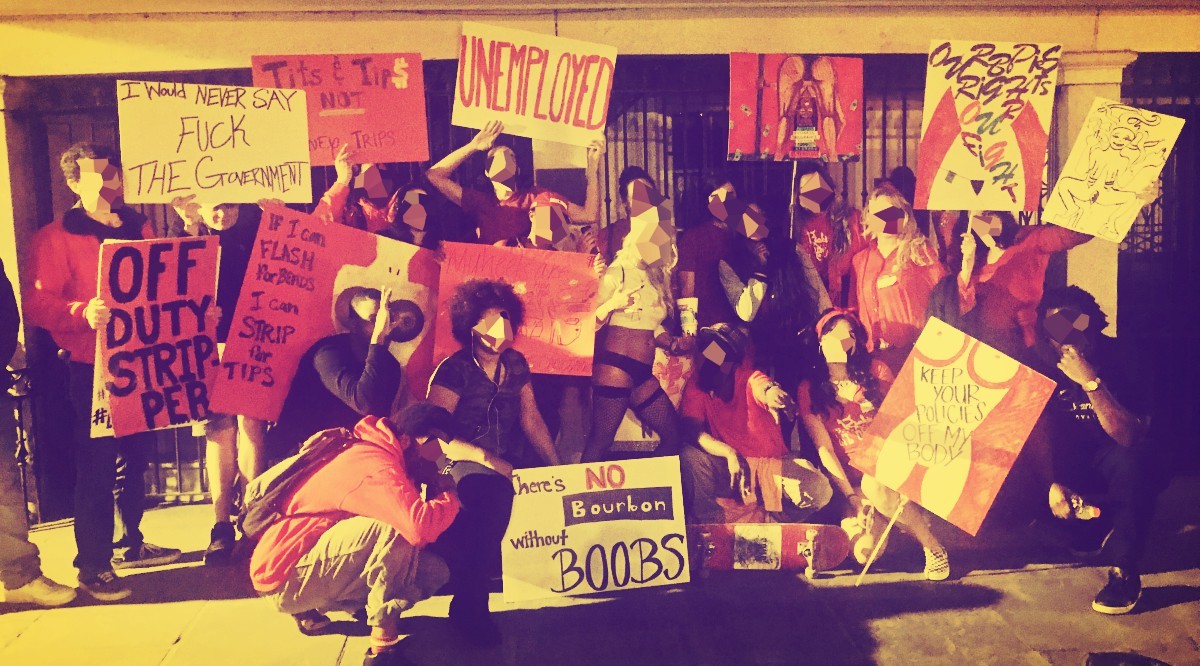
This following report from strippers in New Orleans discusses ongoing actions against police raids, criminalization, and gentrification on Bourbon Street.
“A favorite chant throughout the chaos was “Fuck the cops, fuck the raids, all we want is to be paid!”’
The fight against the criminalization of strippers and nightlife workers has continued in New Orleans. On January 31st a group of thirty strippers crashed a press conference scheduled for the Bourbon Street infrastructure redevelopment plan to protest the January raids and subsequent closures of the city’s strip clubs.
Protesters drowned out speeches with chants of “Sex work is real work,” holding signs engulfing the city officials in a public display of outrage. Red umbrellas floated in the crowd with messages of “We Deserve to Eat.” They couldn’t get a word in, Mayor Mitch Landrieu was a no show, and we proved we would not be pushed off the new Bourbon street. In an amplified speak-out after the disruption, one stripper exclaimed that under the laws being enforced during these raids, which consider touching one’s own body a lewd act, she has less body autonomy than a corpse.
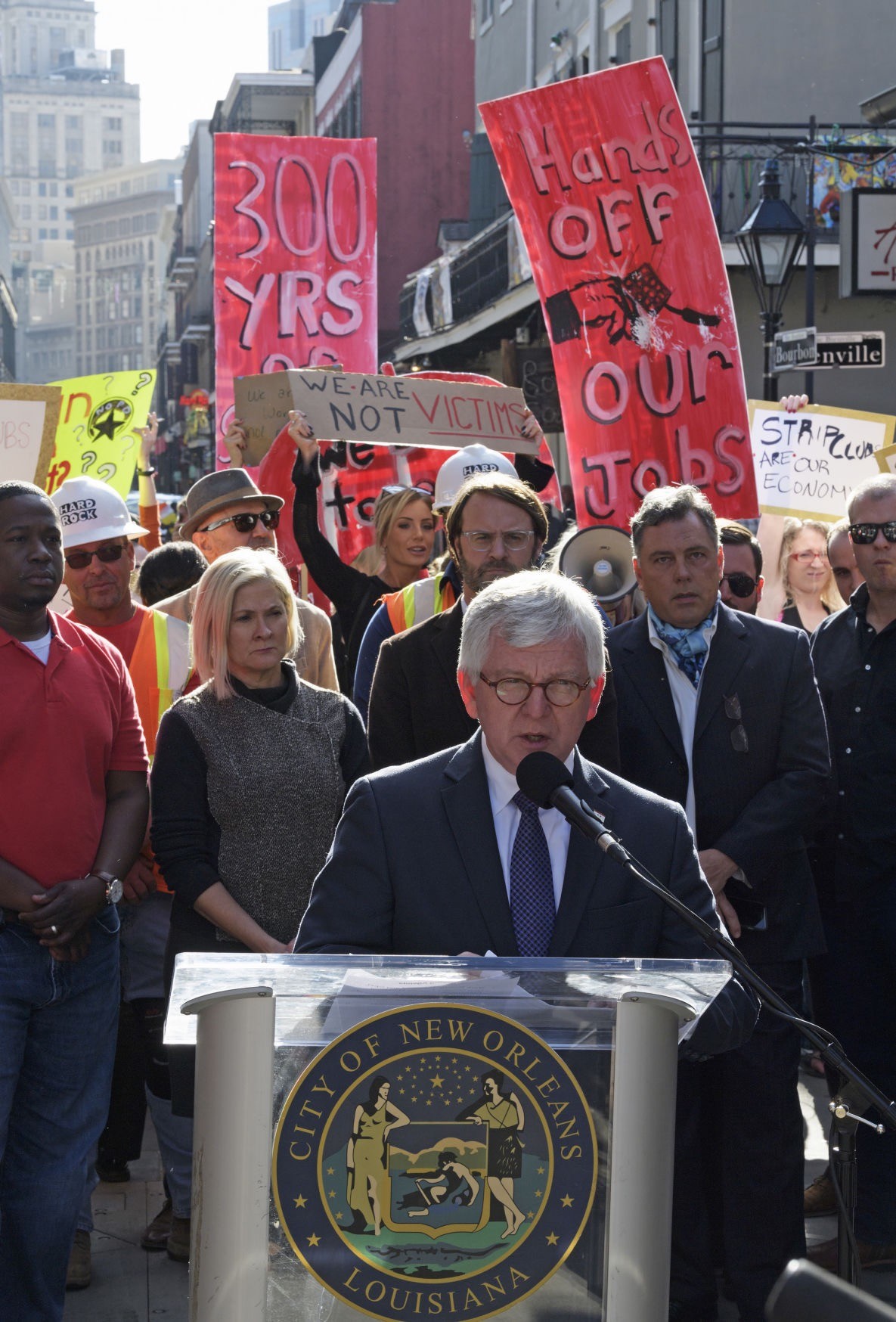
“What felt like a high potential to disrupt Bourbon Street’s business-as-usual was stagnated by organizers’ fears of police retaliation.”
This energy grew and continued, leading to a march on February 1st called by a manager of Rick’s Saloon, and answered by hundreds of strippers, club employees, local and traveling sex workers, family, and friends.
Around 700 of us filled Bourbon street, mixing with crowds, creating a roving dance party of glittering signage reading, “Mitch’s cheap political shot is more LEWD than my pubic hair,” “Bourbon Street NOT Sesame street,” “Leave us Alone: No pigs in our clubs,” “Mitch don’t kill my vibe,” “You can’t pave over the iconic women of Bourbon Street.” A favorite chant throughout the chaos was “Fuck the cops, fuck the raids, all we want is to be paid!”
The march was spirited and overall enraged, as bartenders and dancers lamented the loss of income and the control law enforcement had wielded against our bodies in tangible and felt ways. Beneath the Jean Baptiste Le Moyne De Bienville statue at the base of Decatur street, the site of a now-vanished antebellum red light district, we shared the stories of what we’ve lost this year amidst New Orleans’ 300th anniversary. What felt like a high potential to disrupt Bourbon Street’s business-as-usual was stagnated by organizers’ fears of police retaliation.
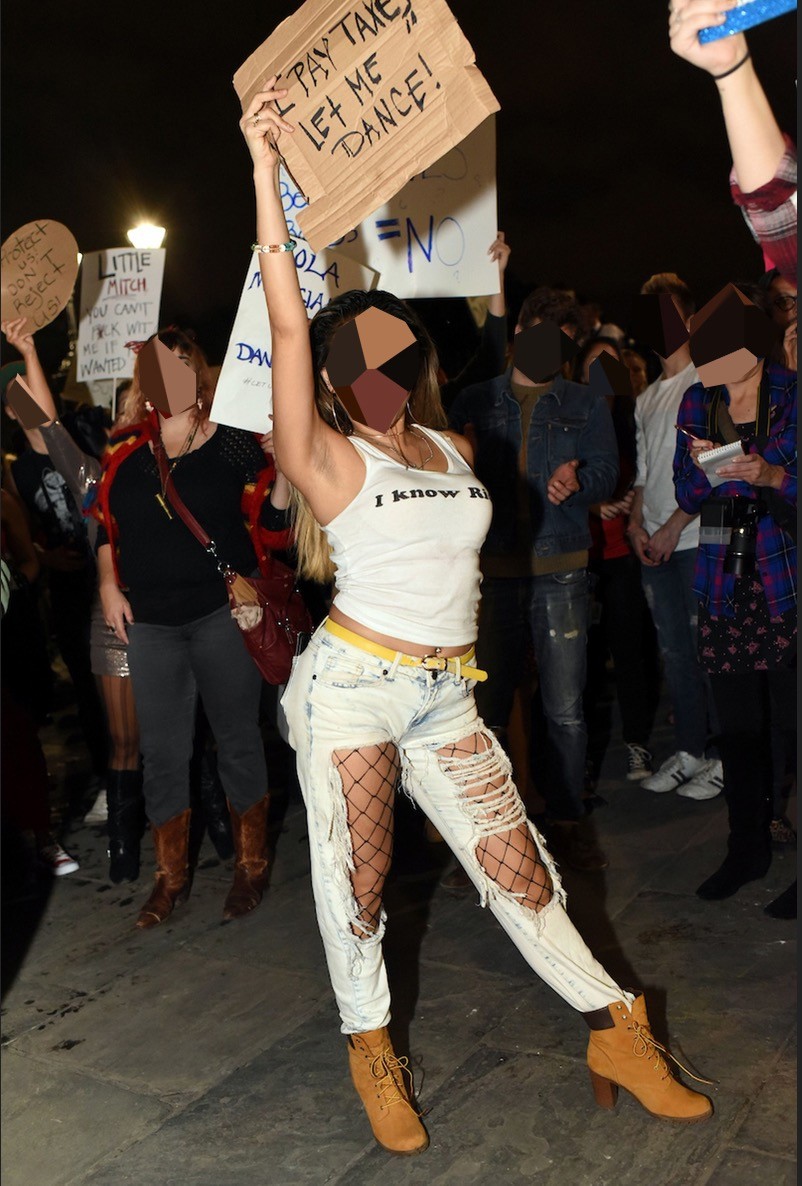
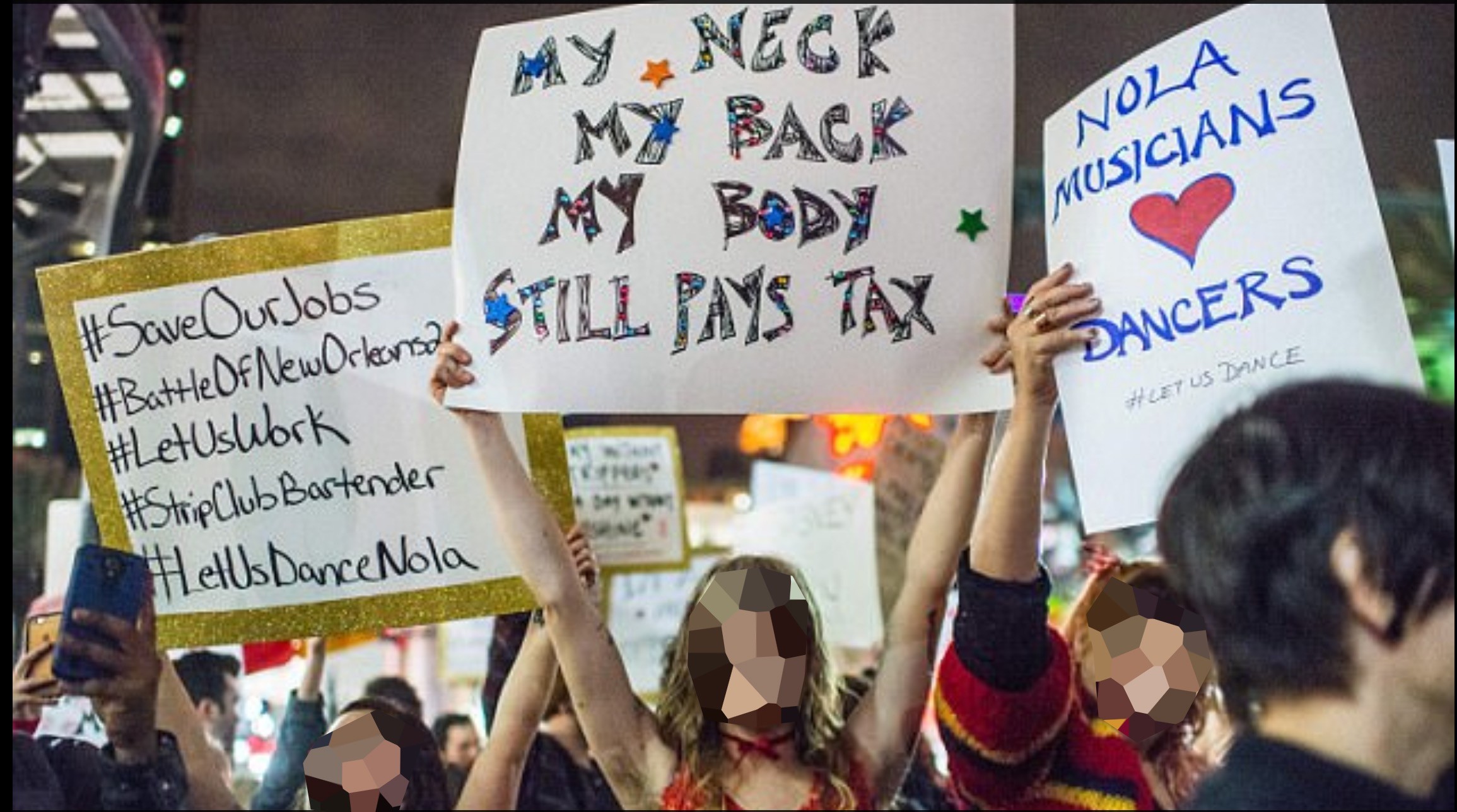
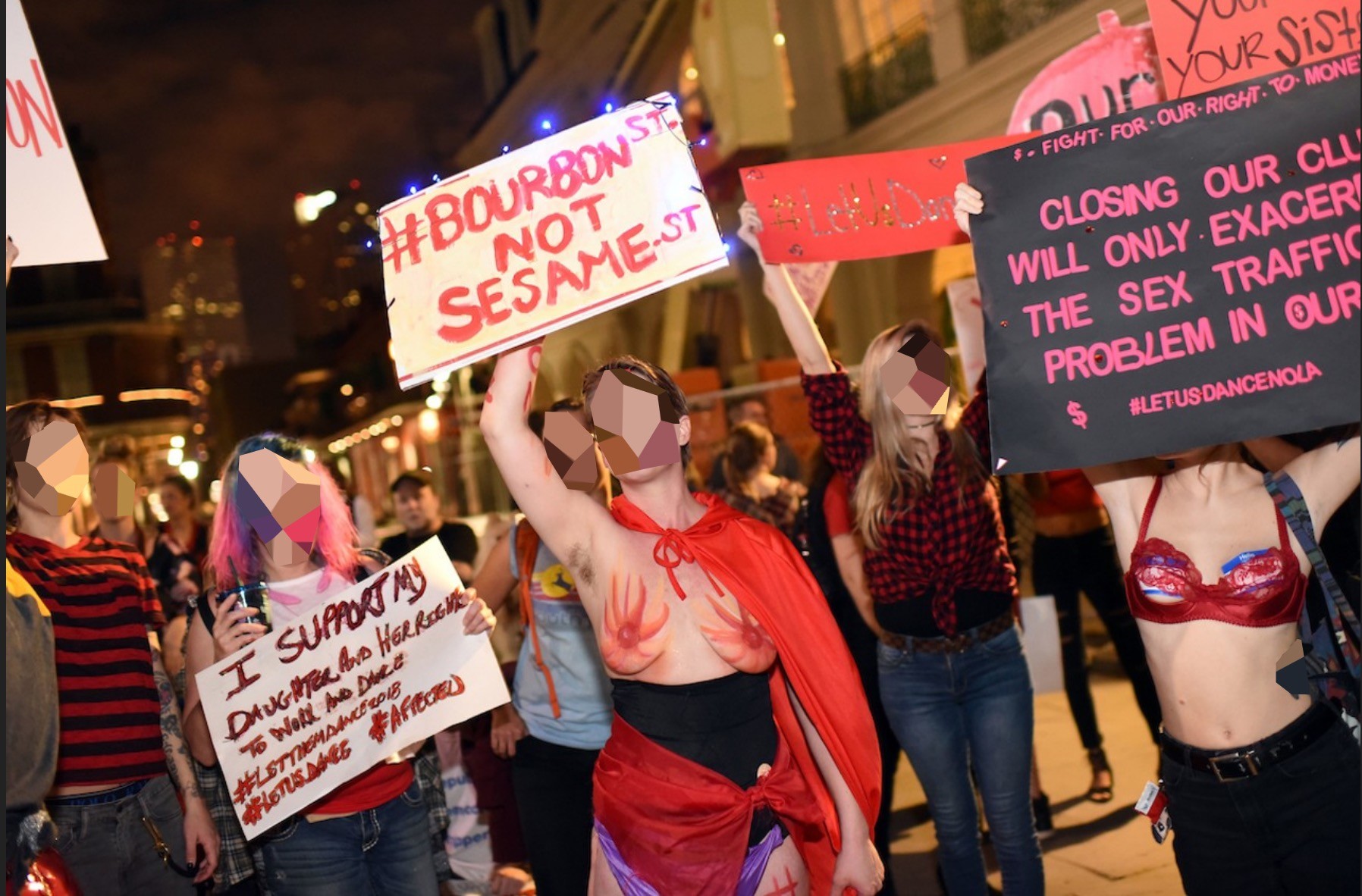
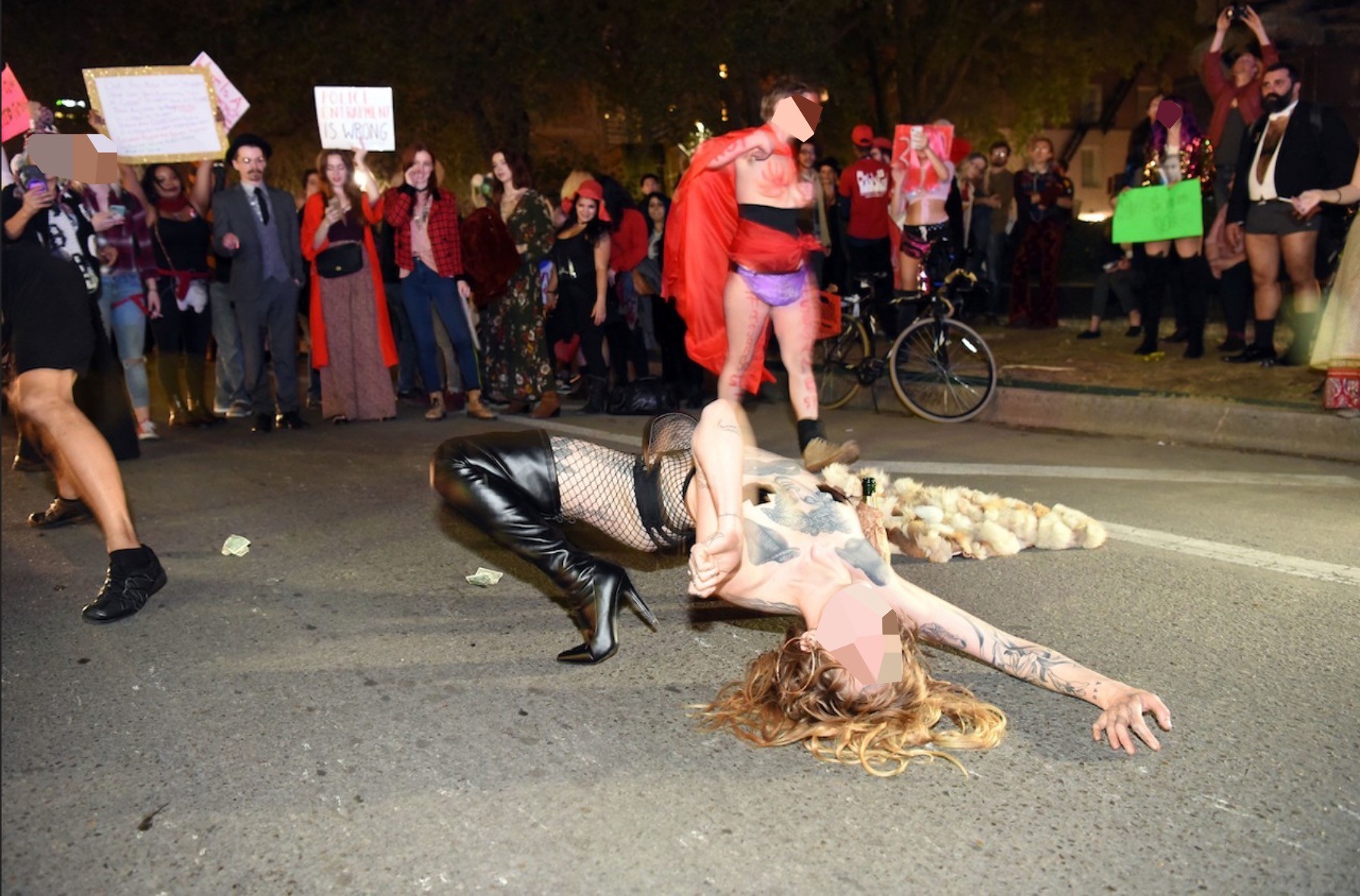
“The raids put hundreds of strippers and nightlife workers out of work.”
The late-January raids conducted by the Louisiana State Office of Alcohol and Tobacco Control (ATC) and the New Orleans Police Department (NOPD) resulted in the liquor license suspension and subsequent indefinite closure of eight clubs. The raids put hundreds of strippers and nightlife workers out of work. Even those of us still with contracts felt reluctant to show, as we lacked details of what acts are considered prostitution. We began to understand that briefly baring breasts or caressing a patron’s clothed genitals were among the few actual violations. The smoke and mirrors strategy of claiming concern over sex-trafficking had the desired effect – we were afraid to do work we otherwise felt safe doing and instead left questioning whether the industry would give out before our knees did.
The Desiree Alliance, a national coalition of current and former sex workers, wrote an on-point letter of support:
“Throwing non-factual data against the wall to see if it sticks is creating a hostile police state that does not protect the workers in legitimate or alternative labor forces. If sex trafficking is the driving force behind raids and arrests, you cannot target one industry without targeting every industry in the Quarter. This is selective and creates hysteria that is not accurate.
Crime is a creation of the state and when you create falsehoods, local economies and tourism suffers greatly. We demand accountability from the NOPD and its government for the harassment, targeting, and arrests of its tax paying citizens that contribute to the economic structure of New Orleans.”
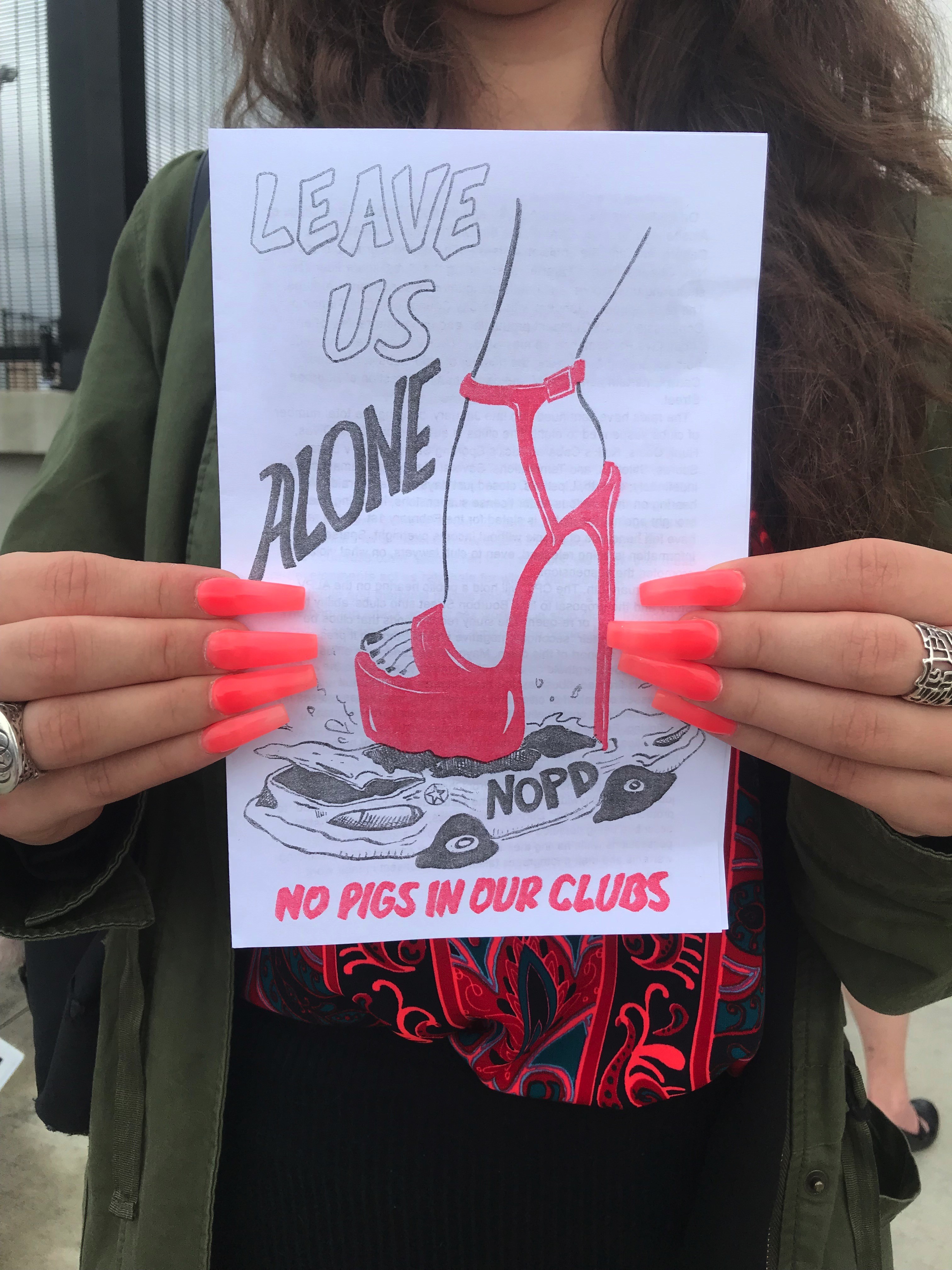
Holding up a pamphlet version of an article that first appeared on It’s Going Down.
Nine clubs were dealt charges on January 19th and 25th, eventually settling with the ATC in order to reopen doors. The clubs paid a total of $28,600, were put on various probationary periods, and scheduled to re-open after deferred suspension on dates leading up to Mardi Gras day. During the hearing, Commissioner Juana Marine-Lombard asserted that police presence in the clubs will continue, due to “trafficking” and “prostitution,” terms and charges the ATC continues to struggle to differentiate.
This settlement took place the morning of the City Planning Commission’s hearing on zoning motion M-17-552, a proposal lifted from 2016’s “Adult Live Performance Venues Study,” drafted to limit the number of clubs on Bourbon Street. An organized effort of strippers and allies showed up to speak against the motion. From BARE’s press release written by Lyn Archer of the Red Light Archive:
Over 300 people from New Orleans, the Gulf South and around the world wrote in to public comment, opposing the ALPV Study and the latest zoning motion. Because of overwhelming support, the hearing was moved to an auxiliary location. The crowd was made up strippers, nightlife workers and supporters, many of whom had lost income, jobs, and contracts, during the raids. Public comment was limited to 20 minutes; strippers and allied professionals spoke on behalf of the displaced workers and against restrictive zoning. Not a single person spoke in support of the Motion.
The CPC moved to “soften” rather than revoke the Motion, lifting the “hard cap” on 14 clubs, and allowing for the potential of future clubs to open through the “conditional use” permit process. During the CPC hearing, it was not made clear whether a future 15th club (beyond the “soft cap”) would be able to open via the “conditional use” process. Of the 14 clubs typically counted in the VCE (excluding three clubs: Bourbon Pub & Parade Disco, Oz, and The Corner Pocket), three have now closed (Dixie Divas, which closed to avoid an ATC hearing; Temptations, which closed due to eviction, based in part on recent charges; Lipstixxs, which closed for renovation into a dance club, but settled with the ATC over undercover charges, despite not being raided). These closures bring the total number of VCE clubs to 11 (14 if counting the aforementioned male clubs).
The ALPV Study recommends that clubs be closed, due to their “secondary negative effects,” such as “trafficking” and crime, though it presents no hard data in support of this claim. Two years ago, before 2015’s “Operation Trick or Treat” raids (which, as with the latest raids, uncovered not a single instance of human trafficking) the count was 23.
Mayor Mitch Landrieu’s office has placed attorney Scott Bergthold on a $15,000 retainer to advise on the ALPV Study. His firm’s sole purpose is to litigate against adult businesses on behalf of cities and counties. Scott Bergthold is also working against the case filed last year by three women, ages 18, 19, and 20, who filed suit after losing their jobs during an age ban put forth in the state legislature. At the time the suit was filed, ATC Commissioner Lombard insisted publicly that the women reveal their names. Like the citywide measures, this statewide age ban was drafted “to protect young women.”
During the February 7th hearing on the age ban’s blocking injunction, the attorneys focused on a discussion of strippers’ attire and bodily coverage; the attorney speaking on behalf of the plaintiffs described a colleague opposing the age ban being “mocked off the floor” during the state legislation. The judges left without coming to a decision.
City Council still plans to hear this agenda item, limiting speakers to 5 per side and 15 minutes total, on Thursday, March 22th. We will be there. There is an ongoing call-in leading up to the meeting.
The raids may have ceased, but the dust is hardly settling. On February 28th, the Louisiana ATC released the consent judgements against the raided strip clubs that had settled. The terms in order to prevent future raids are measures to be carried out by club owners and management, including: instituting additional training on “human trafficking” and “prostitution,” adding security personnel and surveillance cameras, instituting a zero-tolerance contract termination and employee firing policy, allowing third-party “mystery shoppers” to enter and surveil the clubs, bag checks, mandatory reporting to the ATC for any offenses, and one-year probationary sentences with additional consequences for second and third offenses, including fines, liquor license suspensions and club closures.
"We want to move out of a territory where we're just constantly defending our right to exist." Stripped of work: French Quarter strip club workers and the fight for jobs https://t.co/PyUwausm0y
— BARE NOLA (@bare_nola) February 16, 2018
We’ve been staying busy, stickers and posters are appearing across the city warning the pigs to stay away. BARE NOLA and others have kept social media and outreach fired up, collaborating and garnering support from across the world, as we are aware strippers everywhere are facing down the state and abusive work conditions.
Survive The Club, a blog run by stripper coach extraordinaire Chase Kelly, is gathering statements from nightlife workers on the effect of efforts to shut down adult performance venues across the United States. The survey form states:
“This information is used to show the impact of these policies on our lives and work. We are organizing, and when we are done here we will come and share our data with you all, so you can defend your jobs in your cities, too.”
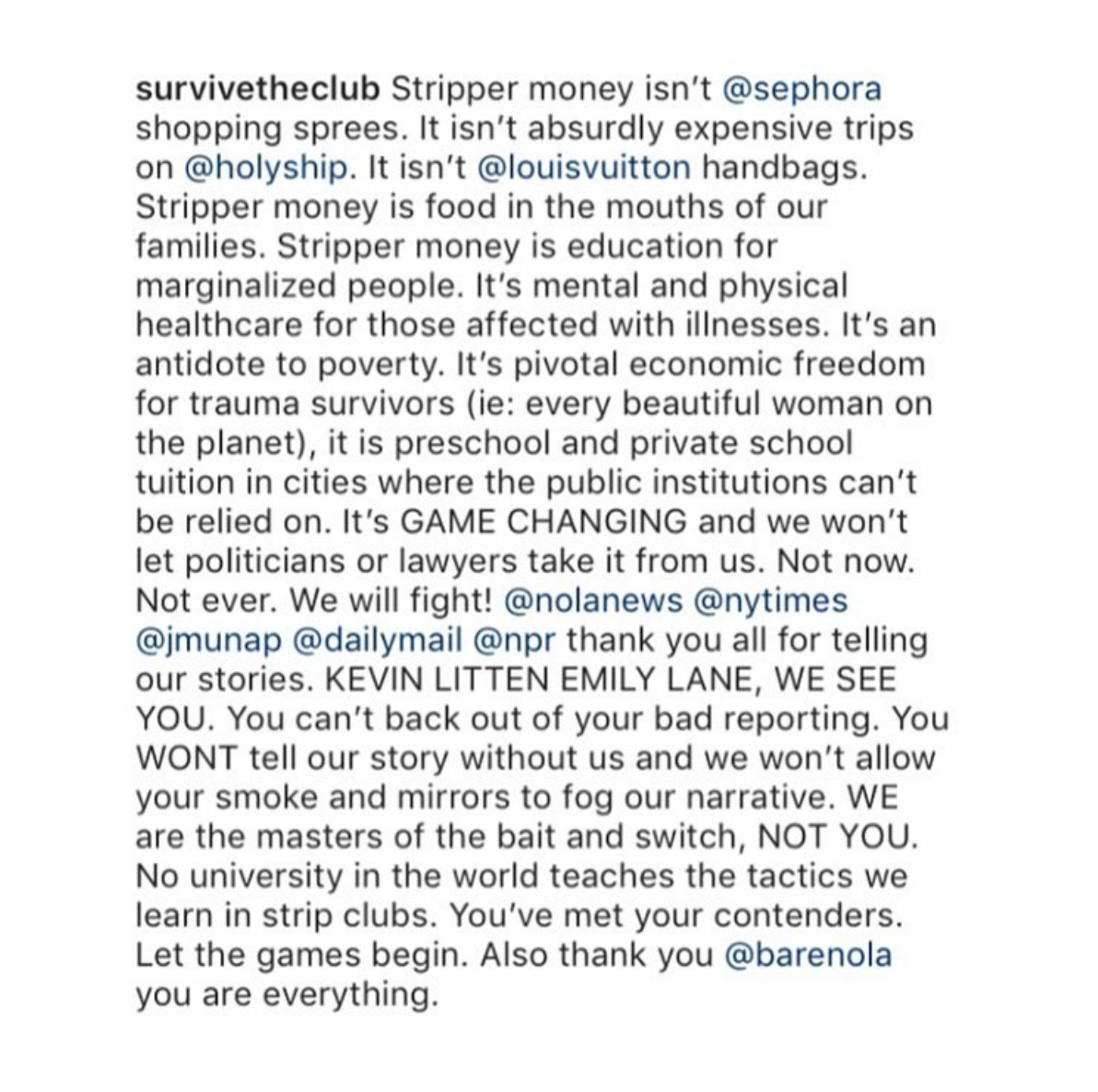
In the weeks leading up to Mardi Gras, Women With a Vision, a community-based non-profit founded in 1989 by a grassroots collective of African-American women in response to the spread of HIV/AIDS in communities of color, warned that the Louisiana state police and the FBI were setting up stings in local hotels using BackPage.com. Unshockingly, similar reports come from our friends in Minneapolis on the other side of the Superbowl:
In line with the anti-prostitution and moral hygiene history of anti-trafficking projects, the notable city-funded investigations and accompanying coverage leading up to the superbowl on the ‘hazards’ of the sex industry were premised upon the harmful presumption that sex work increases the risk of sex trafficking. One study by the University of Minnesota’s Urban Research Outreach Center even reports finding no relationship between sex work and trafficking and yet an entire story is built to support the need for “anti-trafficking” prevention via the surveillance of sex work in the Twin Cities as well as a recommendation to continue the fervor of ever-stigmatizing trafficking awareness-raising coverage.
Just as in New Orleans leading up to Mardi Gras, the Minneapolis public was served “in-vogue vague-reporting about trafficking stings conducted the week of the Superbowl.” Reporters help the police reassure the public that the massive funding law enforcement has received for anti-trafficking operations is being put to use. The lines are easily traced. Former sex worker and writer Melissa Gira Grant reported:
“In 2015, Covenant House New Orleans received a $900,000 anti-trafficking grant from the Department of Justice to work in partnership with the Jefferson Parish Sheriff’s Office (which received $600,000) ‘to support law enforcement efforts and victim services for the next three years.”’
“We see this as a direct attack on the self-organized accomplishments of sex workers put forth in order to overcome state violence as well as protect ourselves without the involvement of entities one may categorize as pimps.”
We make a call for national collaboration and scheming, as the state continues to make all forms of sex work more dangerous. In the state legislature, several bills (HB 235, HB 585, SB 192) have been introduced this week to change the terms defining acts that can be criminalized as “prostitution,” including simulated erotic acts or touching of one’s body, or appearing in a “semi-nude” state.
The bills also impose mandatory training on human trafficking for “sexually oriented businesses,” which are categorically differentiated in the bills from other nightlife businesses offering live entertainment (such as theaters) inside of which, erotic or nude performers are protected by the first amendment.
Federally, FOSTA/SESTA (“Fight Online Sex Trafficking Act” and “Stop Enabling Sex Traffickers Act”) passed in Congress and is up for a vote at the Senate this week, making it illegal for sex workers of any kind to advertise, or to communicate with one another online, including for safety and community cohesion. We see this as a direct attack on the self-organized accomplishments of sex workers put forth in order to overcome state violence as well as protect ourselves without the involvement of entities one may categorize as pimps.
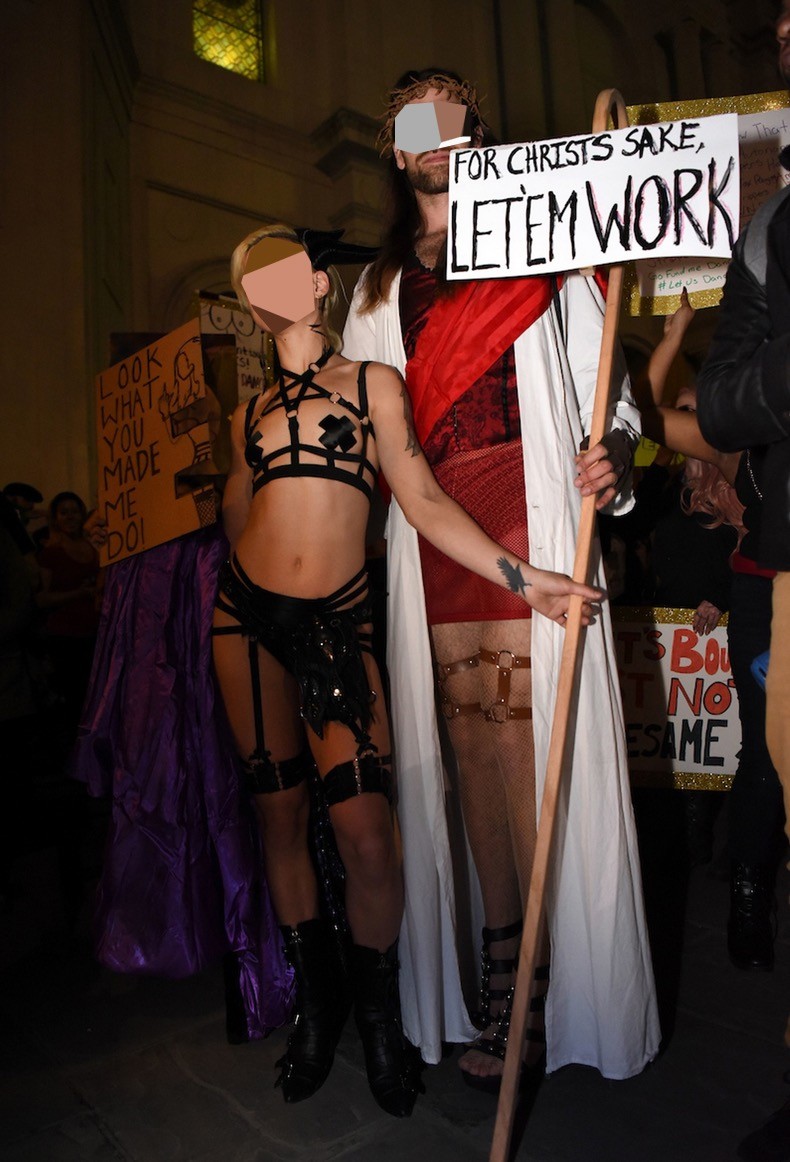
Some of us were able to dance this Mardi Gras, but, of course, not our most vulnerable. Entertainment manifests through the various bodies who brave the stigma to make it onto your lap. The magical aura is not born out of dim light and cocktails. It is born out of each stripper who finds their unique place in the web of dark corners and sparkling stages. We are sad to see Dixie Divas close, a small club owned by a trans woman. Trans dancers and others who aren’t hired at corporate clubs are being stripped of flexibility, freedom, and financial solvency.
Stripping allows us to become independent, support a family, establish community and pursue other projects and passions. Love to Lipstixx and Temptations. Love to the dirty corners of the world where truth out glamours the darkness, love to our witching realm of mirrors and blue neon, love to the sex workers who have endured every knife capitalism throws at them, love to the strippers and whores who hold the burden of facilitating the catharsis of this world.
AGAINST YOUR TIRED MORALS, NOT SEX WORK! AGAINST THE POLICE!
Anonymous Strippers of New Orleans
Recommended Reading
https://www.huffingtonpost.com/entry/nyc-stripper-strike_us_5a73880fe4b01ce33eb11c88
https://www.instagram.com/barenola/
https://www.survivetheclub.com/secondary-top-nav/2018/2/5/urgent-stripper-field-work
https://belliresearchinstitute.com/2018/01/15/the-myths-of-sex-trafficking/





